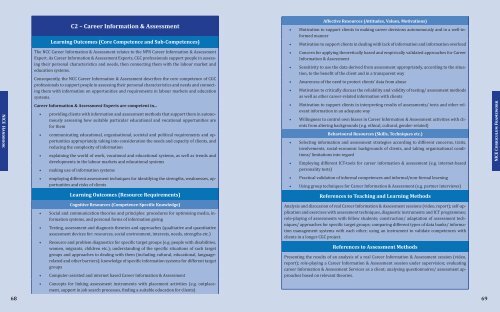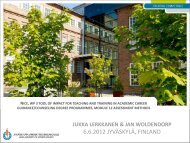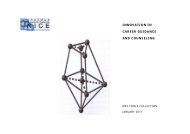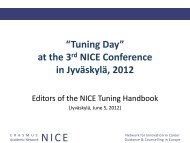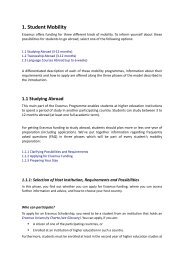NICE HANDBOOK â Academic training of Career ... - Nice-network.eu
NICE HANDBOOK â Academic training of Career ... - Nice-network.eu
NICE HANDBOOK â Academic training of Career ... - Nice-network.eu
Create successful ePaper yourself
Turn your PDF publications into a flip-book with our unique Google optimized e-Paper software.
<strong>NICE</strong> HandbookC2 – <strong>Career</strong> Information & AssessmentLearning Outcomes (Core Competence and Sub-Competences)The NCC <strong>Career</strong> Information & Assessment relates to the NPR <strong>Career</strong> Information & AssessmentExpert. As <strong>Career</strong> Information & Assessment Experts, CGC pr<strong>of</strong>essionals support people in assessingtheir personal characteristics and needs, then connecting them with the labour market andeducation systems.Consequently, the NCC <strong>Career</strong> Information & Assessment describes the core competence <strong>of</strong> CGCpr<strong>of</strong>essionals to support people in assessing their personal characteristics and needs and connectingthem with information on opportunities and requirements in labour markets and educationsystems.<strong>Career</strong> Information & Assessment Experts are competent in...◆◆◆◆◆◆◆◆◆◆◆◆◆◆◆◆◆◆◆◆providing clients with information and assessment methods that support them in autonomouslyassessing how suitable particular educational and vocational opportunities arefor themcommunicating educational, organisational, societal and political requirements and opportunitiesappropriately, taking into consideration the needs and capacity <strong>of</strong> clients, andreducing the complexity <strong>of</strong> informationexplaining the world <strong>of</strong> work, vocational and educational systems, as well as trends anddevelopments in the labour markets and educational systemsmaking use <strong>of</strong> information systemsemploying different assessment techniques for identifying the strengths, weaknesses, opportunitiesand risks <strong>of</strong> clientsLearning Outcomes (Resource Requirements)Cognitive Resources (Competence-Specific Knowledge)Social and communication theories and principles: procedures for optimising media, informationsystems, and personal forms <strong>of</strong> information givingTesting, assessment and diagnosis theories and approaches (qualitative and quantitativeassessment devices for: resources, social environment, interests, needs, strengths etc.)Resource and problem diagnostics for specific target groups (e.g. people with disabilities,women, migrants, children etc.); understanding <strong>of</strong> the specific situations <strong>of</strong> such targetgroups and approaches to dealing with them (including cultural, educational, languagerelatedand other barriers); knowledge <strong>of</strong> specific information systems for different targetgroupsComputer-assisted and internet based <strong>Career</strong> Information & AssessmentConcepts for linking assessment instruments with placement activities (e.g. outplacement,support in job search processes, finding a suitable education for clients)Affective Resources (Attitudes, Values, Motivations)68 69◆◆◆◆◆◆◆◆◆◆◆◆◆◆◆◆◆◆◆◆◆◆◆◆Motivation to support clients in making career decisions autonomously and in a well-informedmannerMotivation to support clients in dealing with lack <strong>of</strong> information and information overloadConcern for applying theoretically based and empirically validated approaches for <strong>Career</strong>Information & AssessmentSensitivity to use the data derived from assessment appropriately, according to the situation,to the benefit <strong>of</strong> the client and in a transparent wayAwareness <strong>of</strong> the need to protect clients’ data from abuseMotivation to critically discuss the reliability and validity <strong>of</strong> testing/ assessment methodsas well as other career-related information with clientsMotivation to support clients in interpreting results <strong>of</strong> assessments/ tests and other relevantinformation in an adequate wayWillingness to control own biases in <strong>Career</strong> Information & Assessment activities with clientsfrom altering backgrounds (e.g. ethical, cultural, gender-related)Behavioural Resources (Skills, Techniques etc.)Selecting information and assessment strategies according to different concerns, traits,involvements, social-economic backgrounds <strong>of</strong> clients, and taking organisational conditions/limitations into regardEmploying different ICT-tools for career information & assessment (e.g. internet-basedpersonality tests)Practical validation <strong>of</strong> informal competences and informal/non-formal learningUsing group techniques for <strong>Career</strong> Information & Assessment (e.g. partner interviews)References to Teaching and Learning MethodsAnalysis and discussion <strong>of</strong> real <strong>Career</strong> Information & Assessment sessions (video, report); self-applicationand exercises with assessment techniques, diagnostic instruments and ICT programmes;role-playing <strong>of</strong> assessments with fellow students; construction/ adaptation <strong>of</strong> assessment techniques/approaches for specific target groups; comparing different types <strong>of</strong> data banks/ informationmanagement systems with each other; using an instrument to validate competences withclients in a longer CGC project.References to Assessment MethodsPresenting the results <strong>of</strong> an analysis <strong>of</strong> a real <strong>Career</strong> Information & Assessment session (video,report); role-playing a <strong>Career</strong> Information & Assessment session under supervision; evaluatingcareer Information & Assessment Services as a client; analysing questionnaires/ assessment approachesbased on relevant theories.<strong>NICE</strong> Curriculum Framework


